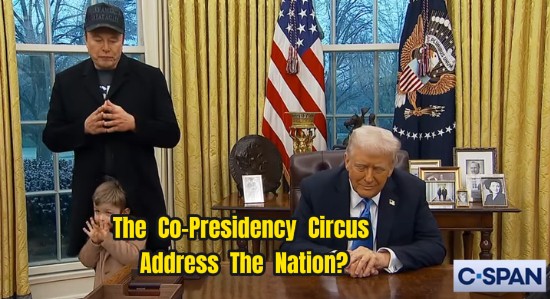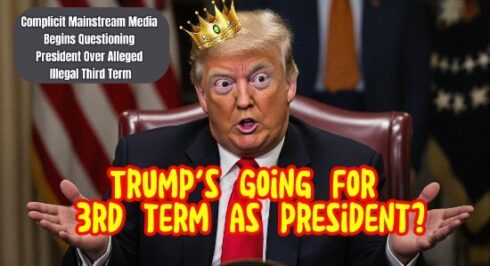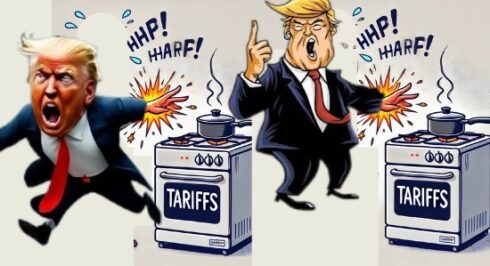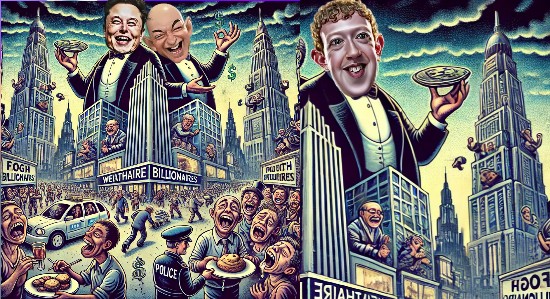OP-ED
In a historic display of irony and confusion, the co-presidents of the United States—Donald Trump and Elon Musk—met the press at the White House. If you thought democracy was in a fragile state before, Musk’s speech on the Department of Government Efficiency (DOGE) might convince you that it’s now held together with duct tape and Tesla stock options.
Musk, self-appointed czar of governmental streamlining, embarked on a verbal rollercoaster about democracy, bureaucracy, and, inexplicably, the national deficit. At one point, he appeared to be explaining DOGE as if it were the guardian angel of American democracy, despite its bulldozer approach to all congressional oversight. If democracy needs rescuing, DOGE might be the knight that gallops in the wrong direction.
The DOGE of Confusion By The Co-Presidents of the United States
During the brief press interaction by the co-presidents of the United States Elon Musk answers when asked “What is the goal of DOGE? And I think a significant part of the presidency is to restore democracy. This may seem like, well, obvious democracy. Well, if you don’t have a feedback, we’d have to if you sorry Um, so If there’s not a good feedback loop from the people to to the government…”
At this point, any rational listener would be questioning if Musk had been hacked by ChatGPT mid-sentence. His attempt to explain democracy sounded more like an AI bot trying to self-correct in real-time. The speech continued in a dizzying loop of bureaucratic fear-mongering and an ambitious pledge to “fix that feedback loop.”
According to Musk, democracy isn’t real if bureaucrats have power—only elected officials should have control. In other words, democracy must be saved by ignoring all institutions designed to uphold it. This is the same Musk whose DOGE initiative steamrolled its way through government agencies, bypassing congressional checks with all the subtlety of a SpaceX rocket launch gone wrong.
The Real Threat to Democracy: DOGE Itself
Musk’s entire argument is built on the premise that democracy is under siege from an unelected bureaucracy. But in a bizarre twist, the biggest offender of that very principle seems to be DOGE itself. Established as a government efficiency initiative, DOGE appears to be operating with little transparency, no oversight, and a leadership structure that looks suspiciously like a one-man show.
How does one restore democracy by removing the very agencies that ensure governmental accountability? And why does this feel less like a democratic reform and more like an authoritarian power grab wrapped in Silicon Valley buzzwords?
Meanwhile, Trump stood by Musk, nodding sagely, as if pretending to understand words like “feedback loop” while secretly wondering when he could pivot back to talking about crowd sizes.
The Deficit Distraction: The Co-Presidents of the United States‘ Math Problem
Midway through his speech, Musk abruptly shifted from democracy to America’s national debt, throwing in a dramatic claim: “The interest payments alone on the national debt exceed the defense department budget.”
While it’s true that the U.S. deficit is a problem, Musk’s attempt to blame bureaucracy for the financial crisis seems about as accurate as claiming Tesla runs on positive cash flow. Ironically, DOGE itself could be adding to the deficit by operating outside congressional scrutiny, with Musk’s signature expensive inefficiencies at play.
Let’s not forget that Musk is a billionaire who thrives on government subsidies yet suddenly finds himself worried about national spending when it comes to programs that benefit the public rather than corporations like his own. It’s the classic “privatize the gains, socialize the losses” philosophy, now rebranded under DOGE.
So, Who Wins? Not Democracy
At the end of the day listening to the co-presidents of the United States, this press conference wasn’t about democracy—it was about power. Musk and Trump’s shared vision of government isn’t one that prioritizes the will of the people, but rather one that concentrates decision-making into the hands of a few, bypassing those pesky “bureaucrats” who ensure accountability.
If democracy truly needed saving, it wouldn’t be from bureaucrats—it would be from those trying to rewrite the rules under the guise of “efficiency.” And if Musk wants us to believe in DOGE’s mission, he might want to start by making a speech that doesn’t sound like a beta version of a malfunctioning AI.
For now, democracy still stands—not thanks to DOGE or the co-presidents of the United States, but in spite of them.














